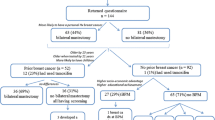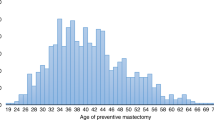Abstract
The purpose of this study is to measure the impact of a multidisciplinary one-stop follow-up clinic (MDOSC) on breast and ovarian surveillance, risk reducing surgery and enrolment in clinical trials in BRCA1/2 carriers. All BRCA1/2 carriers in our region were invited and chose which specialists to see in our MDOSC offering best practice using clinical protocols based on national guidelines and published data. Uptake was evaluated over 24 months recording numbers of individuals undergoing breast and ovarian surveillance, risk reducing surgery, newly diagnosed cancers, their method of detection and participation in clinical trials. 172 (60%) of invited BRCA1/2 carriers chose to attend the MDOSC. Breast surveillance was initiated in 88% and screening frequency altered in 14% of women to comply with national guidelines. Risk reducing salpingo-oophorectomy was chosen by 47% of women and an additional 39% were considering it. The rate of failure to remove fallopian tubes fell from 15 to 3% of procedures (P < 0.01) and peritoneal washings and serial sectioning of tubes and ovaries rose from 25% and 14% before, to 67% (P < 0.001) and 63% (P < 0.001) procedures, respectively, after initiation of our MDOSC. 24% of women considered and 18% decided to undergo risk reducing mastectomy during the follow-up period. Participation in clinical trials increased significantly from 51 to 229 enrolments (P < 0.001). Our novel MDOSC designed to devise an individually tailored cancer risk management strategy had a high uptake amongst our BRCA1/2 carriers. Attendance resulted in improved breast and ovarian cancer risk management.

Similar content being viewed by others
References
Slattery ML, Kerber RA (1993) A comprehensive evaluation of family history and breast cancer risk. JAMA 270:1563–1568
Colditz GA, Willett WC, Hunter DJ et al (1993) Family history, age and risk of breast cancer. JAMA 270:338–343
Easton DF, Breast Cancer Linkage Consortium et al (1995) Breast and ovarian cancer incidence in BRCA1-mutation carriers. Am Hum Gen 56:256–271
Familial breast cancer: the classification and care of women at risk of familial breast cancer in primary, secondary and tertiary care (partial update of CG14). http://guidance.nice.org.uk/page.aspx?o=CG14. Cited 24 Aug 2009
UK Clinical Research Network: Portfolio Database. http://pfsearch.ukcrn.org.uk/StudyDetail.aspx?TopicID=1&StudyID=1069. Cited 24 Aug 2009
Epidemiological Study of Familial Breast Cancer. http://www.srl.cam.ac.uk/genepi/embrace/embrace_home.html. Cited 24 Aug 2009
http://www.cceb.upenn.edu/pages/prose/. Cited 24 Aug 2009
IMPACT. http://impact-study.co.uk/en/researchers/home. Cited 24 Aug 2009
IBIS. http://www.ibis-trials.org/index.php. Cited 24 Aug 2009
BRCA trial. http://www.breakthroughresearch.org.uk/clinical_trials_clinical_researchers/clinical_trials/brca_trial/index.html. Cited 24 Aug 2009
American Society of Clinical Oncology (2003) American Society of Clinical Oncology policy statement update: genetic testing for cancer susceptibility. J Clin Oncol 21(12):2397–2406
Bernadette A, Heemskerk-Gerritsen M, Brekelmans CTM et al (2007) Prophylactic mastectomy in BRCA1/2 mutation carriers and women at risk of hereditary breast cancer: long term experiences at the Rotterdam family cancer clinic. Ann Surg Oncol 14(12):3335–3344
Rebbeck TR, Lynch HT, Neuhausen SL, Prevention and Observation of Surgical End Points Study Group et al (2002) Prophylactic oophorectomy in carriers of BRCA1 or BRCA2 mutations. N Engl J Med 346(21):1616–1622
Kauff ND, Satagopan JM, Robson ME et al (2002) Risk-reducing salpingo-oophorectomy in women with a BRCA1 or BRCA2 mutation. N Engl J Med 346:1609–1615
Brose MS, Rebbeck TR, Calzone KA et al (2002) Cancer risk estimates for BRCA1 mutation carriers identified in a risk evaluation program. J Natl Cancer Inst 94:1365–1372
Piek JM, Torrenga B, Hermsen B et al (2003) Histopathological characteristics of BRCA1- and BRCA2-associated intraperitoneal cancer: a clinic based study. Fam Cancer 2(2):73–78
Callahan MJ, Crum CP, Medeiros F et al (2007) Primary fallopian tube malignancies in BRCA-positive women undergoing surgery for ovarian cancer risk reduction. J Clin Oncol 25(25):3985–3990
Powell CB, Kenley E, Chen L et al (2005) Risk-reducing salpingo-oophorectomy in BRCA mutation carriers: role of serial sectioning in the detection of occult malignancy. J Clin Oncol 23(1):127–132
Metcalfe KA, Birenbaum-Carmeli D, Lubinski J et al (2008) International variation of uptake of preventive options in BRCA1 and BRCA2 mutation carriers. Int J Cancer 122:2017–2022
Meijers Heijboer H, Brekelmans CT, Menke-Pluymers M et al (2003) Use of genetic testing and prophylactic surgery in families with a BRCA1 or BRCA2 mutation. J Clin Oncol 21:1675–1681
http://www.dh.gov.uk/en/Publicationsandstatistics/Publications/PublicationsPolicyAndGuidance/DH_091261. Cited 7 Sept 2009
Bancroft E, Ardern-Jones A, McReynolds K et al (2007) A description of the first oncogenetic clinic for BRCA1/2 mutation carriers in London: The Carrier Clinic. 57th Annual Meeting of the American Society of Human Genetics 390/T
Acknowledgments
We would like to thank Ms Suzanne Hyams and Ms Sarah Rose for their help in setting-up the MDOSC and in the smooth running of the clinic.
Author information
Authors and Affiliations
Corresponding author
Additional information
This work was supported by a grant for New Services and Innovations in Healthcare from Guy’s and St. Thomas Charity.
Rights and permissions
About this article
Cite this article
Pichert, G., Jacobs, C., Jacobs, I. et al. Novel one-stop multidisciplinary follow-up clinic significantly improves cancer risk management in BRCA1/2 carriers. Familial Cancer 9, 313–319 (2010). https://doi.org/10.1007/s10689-010-9333-x
Published:
Issue Date:
DOI: https://doi.org/10.1007/s10689-010-9333-x




